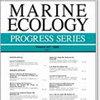乌贼新陈代谢的热敏感性:有氧范围作为可行热栖息地预测指标的功效
IF 2.1
3区 环境科学与生态学
Q2 ECOLOGY
引用次数: 0
摘要
摘要:气候变化导致的海洋变暖会影响海洋外温物种的新陈代谢、表现和生存。在美国东北大陆架(US NES),海水变暖的速度快于全球平均水平,导致该地区平均气温升高,海洋热浪暴露的风险增加。因此,了解气候变暖对该地区海洋生物资源的影响至关重要。在这里,我们对代谢特征的急性温度敏感性进行了量化,以评估它们作为美国东北大西洋棘齿狗鲨急性热耐受性和生存栖息地的可能驱动因素的作用。从10-23°C,标准代谢率比最大代谢率增长更快,导致在较高温度下因子有氧范围缩小。然而,氧气供应能力随着温度的升高而增加,与最大代谢率成正比,而且在最温暖的温度下这两个指标都没有下降,这表明在测试范围内氧气供应能力不会限制动物的表现。尽管行为观察显示,鲨鱼在温度≥20°C时会失去平衡,估计致死温度为∼24°C,从而产生明显的热应力,但鲨鱼在温暖的温度下仍有能力调节其静息代谢率、达到最大活动量和绝对有氧范围峰值。研究结果表明,除氧气供应或有氧范围外,其他因素也制约着尖吻鲭的热耐受性,并支持了有氧范围不能普遍用于确定最佳或可行代谢生境的观点。本文章由计算机程序翻译,如有差异,请以英文原文为准。
Thermal sensitivity of metabolic performance in Squalus acanthias: efficacy of aerobic scope as a predictor of viable thermal habitat
ABSTRACT: Ocean warming due to climate change can affect the metabolism, performance, and survival of ectothermic marine species. On the US Northeast continental shelf (US NES), waters are warming faster than the global average, leading to elevated mean temperatures and an increased risk of marine heatwave exposure in the region. Thus, it is critical to understand the effects of warming on the region’s living marine resources. Here, we quantified the acute temperature sensitivity of metabolic traits to evaluate their role as possible drivers of acute thermal tolerance and viable habitat in the spiny dogfish shark Squalus acanthias on the US NES. From 10-23°C, the standard metabolic rate increased more rapidly than the maximum metabolic rate, resulting in a reduction in factorial aerobic scope at warmer temperatures. However, the oxygen supply capacity increased with temperature in proportion to maximum metabolic rate, and neither metric declined at the warmest temperatures, suggesting oxygen supply capacity does not limit performance within the tested range. Although behavioral observations revealed overt thermal stress via loss of equilibrium at ≥20°C and estimated lethal temperature at ∼24°C, sharks retained the ability to regulate their resting metabolic rate, achieve maximum activity, and peak absolute aerobic scope at warm temperatures. Results suggest that factors other than oxygen supply or aerobic scope are constraining thermal tolerance in S. acanthias and support the notion that aerobic scope cannot be universally applied to determine optimal or viable metabolic habitat.
求助全文
通过发布文献求助,成功后即可免费获取论文全文。
去求助
来源期刊

Marine Ecology Progress Series
环境科学-海洋学
CiteScore
5.30
自引率
8.00%
发文量
238
审稿时长
3 months
期刊介绍:
The leading journal in its field, MEPS covers all aspects of marine ecology, fundamental and applied. Topics covered include microbiology, botany, zoology, ecosystem research, biological oceanography, ecological aspects of fisheries and aquaculture, pollution, environmental protection, conservation, and resource management.
 求助内容:
求助内容: 应助结果提醒方式:
应助结果提醒方式:


